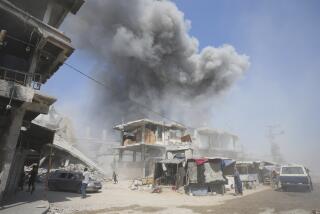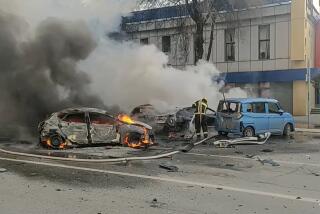Sarajevo Suffers Heavy Shelling; Serbs Accused by U.N. : Balkans: Head of peacekeepers says civilian areas are targeted in the Bosnian capital.
- Share via
SARAJEVO, Bosnia-Herzegovina — The commander of U.N. peacekeepers in Sarajevo accused Serbian forces Monday of targeting non-strategic civilian areas in the heaviest bombardment of the year of the Bosnian capital.
U.N. officials said heavy fighting continued Monday in western Sarajevo near the airport. A battle involving tanks near the key suburb of Stup closed the main airport road. The road later reopened as the shelling subsided, but the airlift of relief supplies to Sarajevo remained suspended.
No flights have arrived since a British plane was fired on Friday.
Col. Marcel Valentin of France, head of U.N. troops in Sarajevo, said his observers counted nearly 2,400 shells in a barrage Sunday, one-sixth of them in the Old City, a mainly residential district without major military positions.
Meanwhile, in other developments:
* Bosnian Serb leader Radovan Karadzic promised to open air and land corridors today to allow thousands of desperate refugees to flee the eastern town of Srebrenica.
Karadzic also told the U.N. Security Council that it was not his goal to capture the town, one of the few remaining Muslim enclaves in eastern Bosnia.
But a representative of the U.N. refugee agency who just returned from Srebrenica said he feared that the Serbs were indeed planning a takeover.
“Maybe they’ll open a corridor and say, ‘Everybody out, or we’ll flatten you.’ There’s nothing to stop them,” agency representative Larry Hollingworth said.
* At The Hague in the Netherlands, Bosnia complained to the International Court of Justice that Yugoslavia is guilty of genocide and other war crimes, the court’s registry said Monday.
In documents submitted to the U.N. court, Bosnia accused the rump Yugoslav nation, composed of Serbia and Montenegro, of violating the U.N. Charter, the Geneva Conventions and other international treaties.
“Yugoslavia . . . has killed, murdered, wounded, raped, robbed, tortured, kidnaped, illegally detained and exterminated the citizens of Bosnia-Herzegovina and is continuing to do so,” it said.
It asked the court to rule that Yugoslavia “must immediately cease and desist from all acts of genocide . . . against the people and state of Bosnia-Herzegovina.”
* At the United Nations, peace talks stalled again and a vote was delayed in the Security Council over authorizing military action to enforce the “no-fly zone” over Bosnia.
Russia was reluctant to authorize action against fellow Slavs.
Enforcement of the zone would be intended primarily to ground Serbian aircraft and prevent aerial attacks on Muslim villages.
Bosnian Serbs strongly hinted they would walk out of the talks if the council calls for military action to ground their aircraft.
* In Bratunac, Serbia, the commander of U.N. troops in Bosnia, Gen. Philippe Morillon, attended the funeral of 39 Bosnian Serbs said to have been killed by Muslim forces.
The bodies, 34 of which have been identified, were found in graves in the eastern Bosnian village of Kravice, which Muslim forces overran on the Serbian Christmas last Jan. 7, and which the Serbs recaptured last week.
* Belgrade authorities charged in a letter circulated Monday that Croatia has been helping smuggle nuclear materials and technologies to the Middle East and Africa, receiving arms and ammunition in return.
“In the past two years, Croatia has emerged as a major link in the international network for smuggling nuclear substances from Eastern Europe to the Middle East and Africa,” a note to the president of the U.N. Security Council said.
“Its primary role is to provide safe storage and false documentation to facilitate the illegal shipment of the nuclear materials.”
As a form of payment for its services, “Croatia is being supplied with arms and ammunition . . . from those international networks operating in Europe and in the Middle East,” the note added.
“As of 1992, these operations have expanded and included also certain chemical and biological weapons.”
The note was sent by Dragomir Djokic, the U.N. charge d’affaires of Yugoslavia, now comprising only Serbia and Montenegro.
* The U.N. commander in Macedonia said he would need thousands of heavily armed NATO troops to ensure that the former Yugoslav republic does not suffer the fate of war-torn Bosnia-Herzegovina.
Analysts fear a spillover of the Yugoslav conflict to Macedonia would drag in its neighbors--possibly even Turkey, the emerging regional power and a member of the NATO alliance.
Gen. Finn Saermark Thomsen said that if the conflicts that engulfed Croatia and Bosnia spill into Macedonia, his peacekeeping force of 700 troops could do nothing but watch.
“If there are conflicts, I can only monitor and report,” the Danish general said Saturday at the U.N. command in Skopje. “If I am going to stop anything, my mandate has to be changed.”
Serbs who rebelled after Bosnia’s secession from Serb-controlled Yugoslavia in February, 1992, have seized 70% of Bosnian territory and are trying to consolidate their hold on eastern Bosnia. Bosnian reports say 134,000 people have died in the year of fighting.
More to Read
Sign up for Essential California
The most important California stories and recommendations in your inbox every morning.
You may occasionally receive promotional content from the Los Angeles Times.













